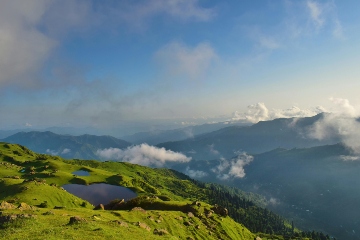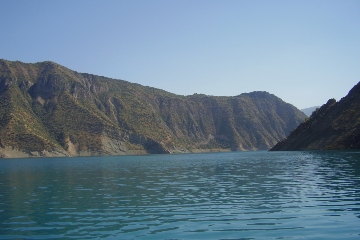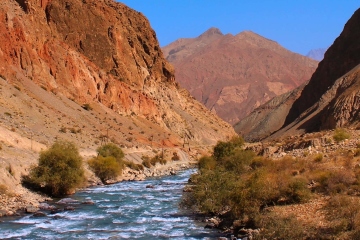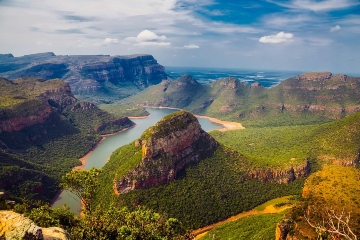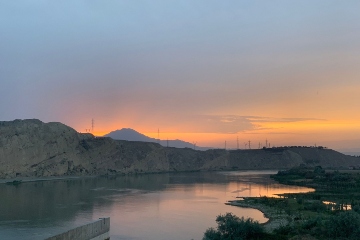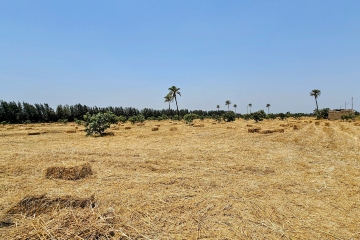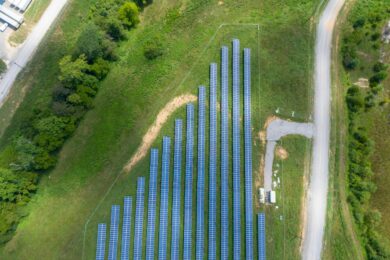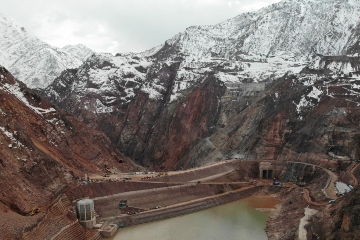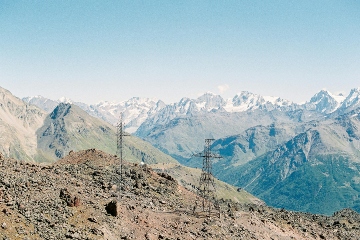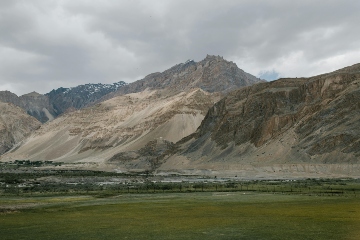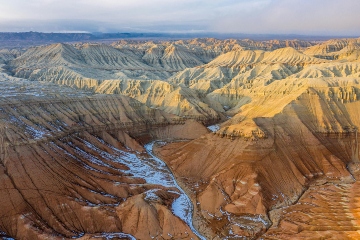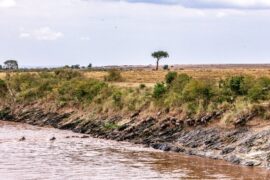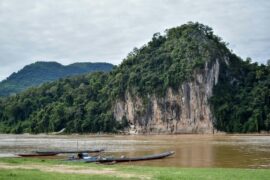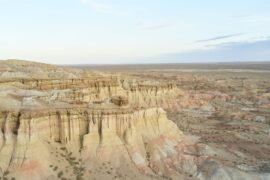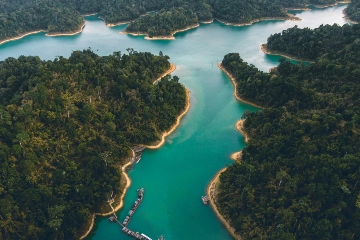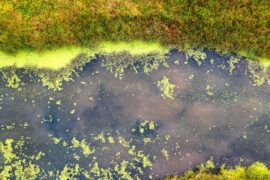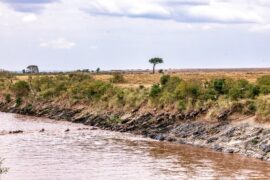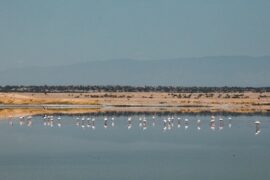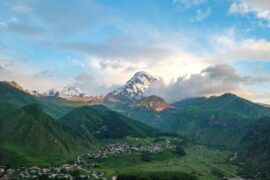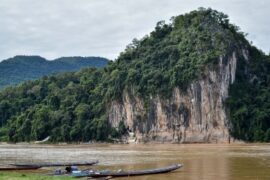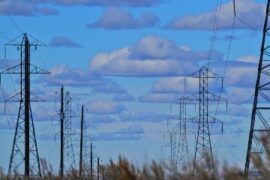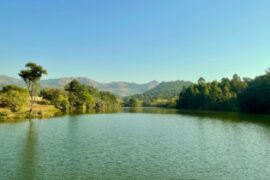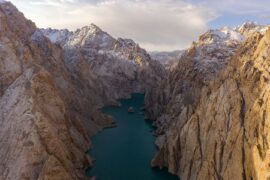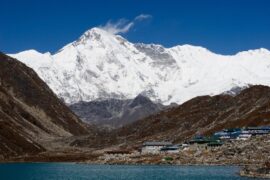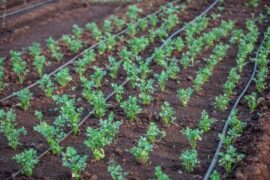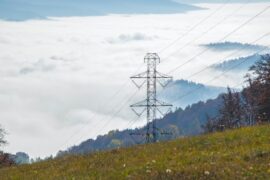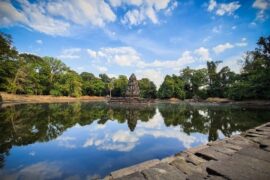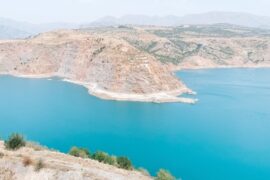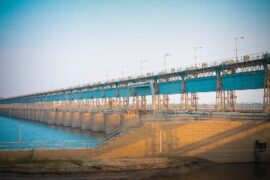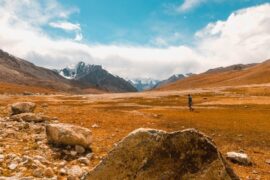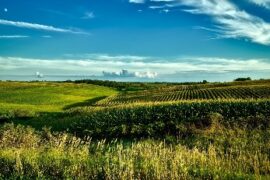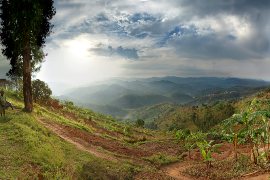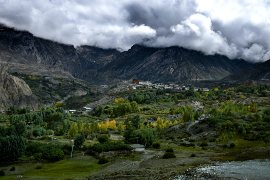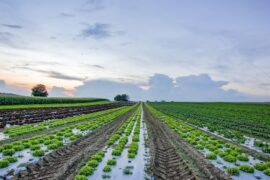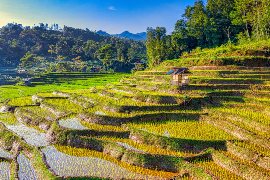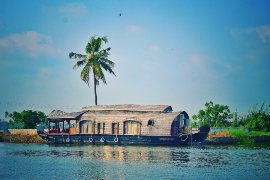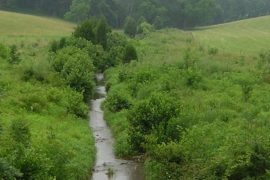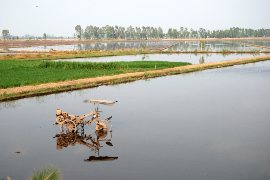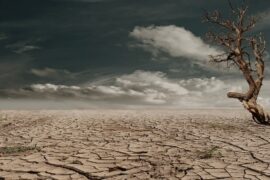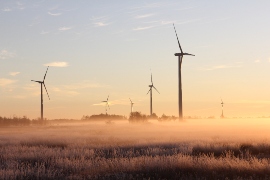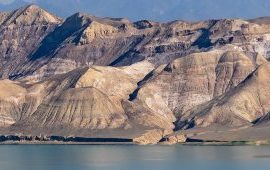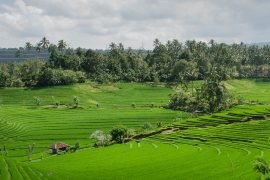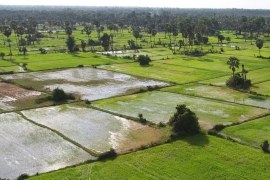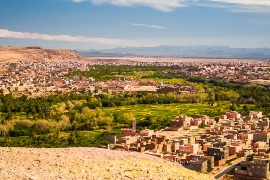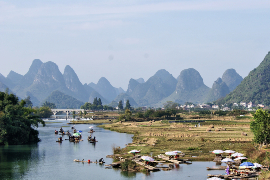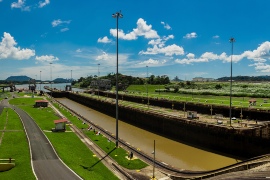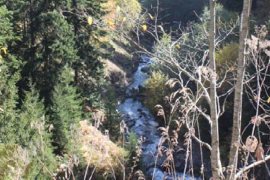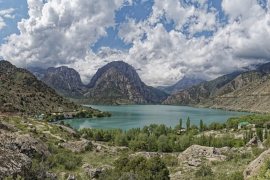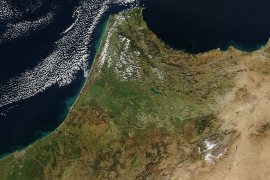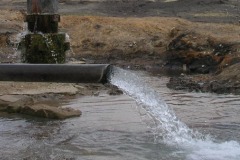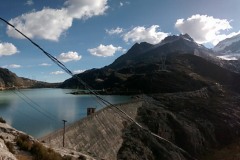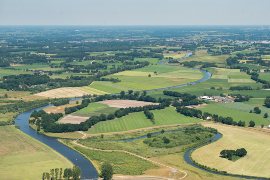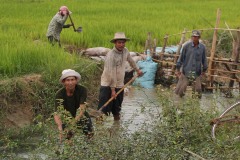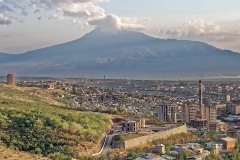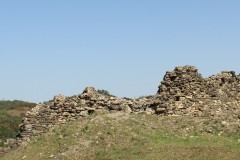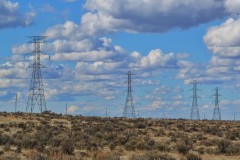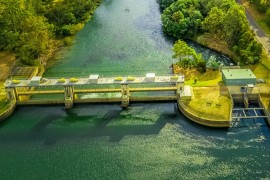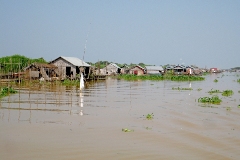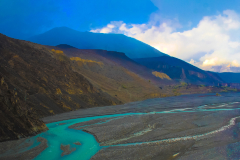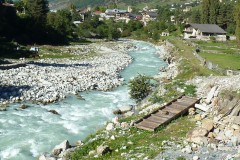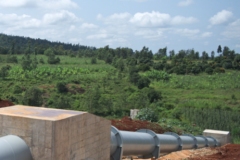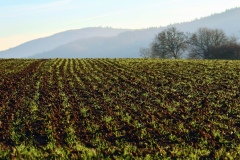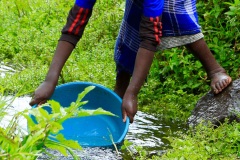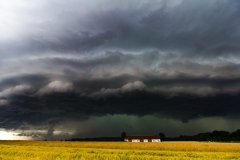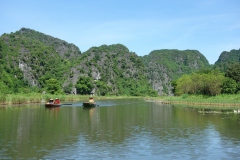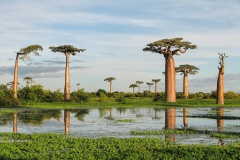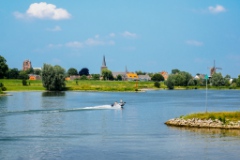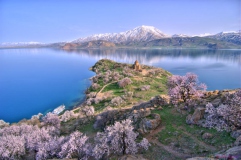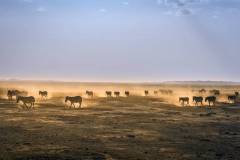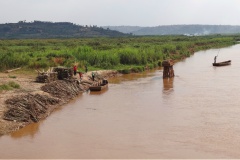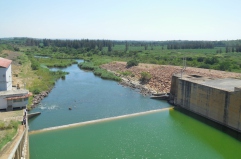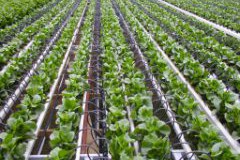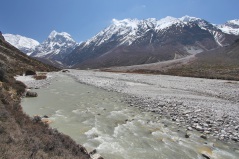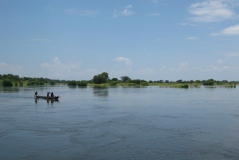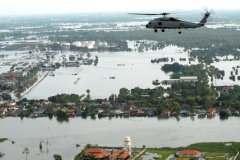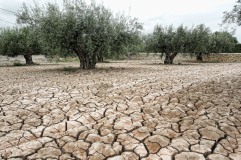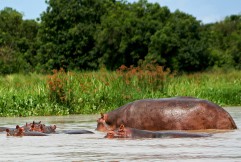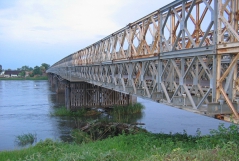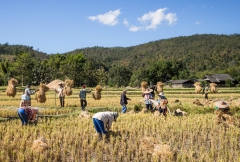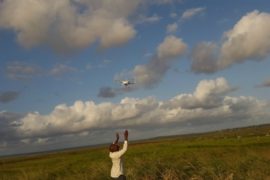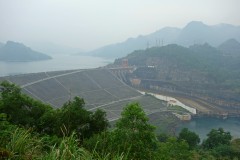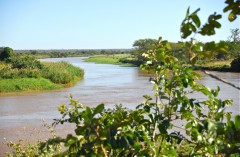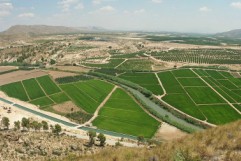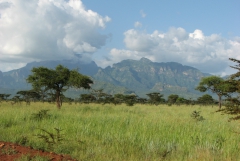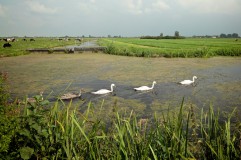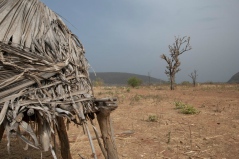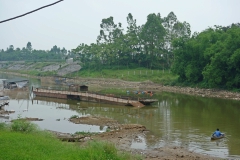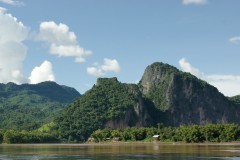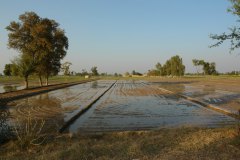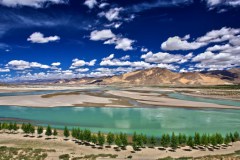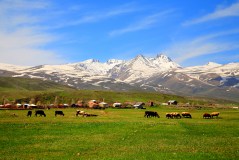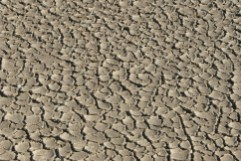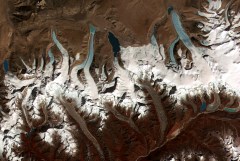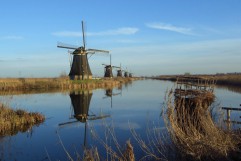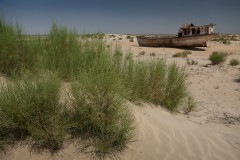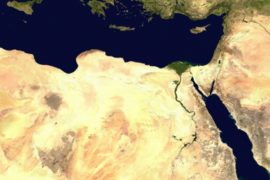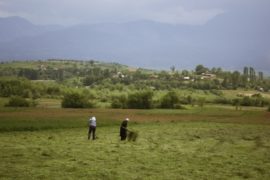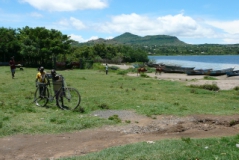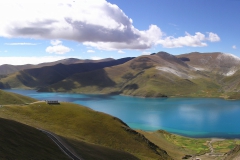Desafío
Las condiciones climáticas varían en tiempo y espacio. Sin embargo, en las últimas décadas el clima está sufriendo cambios drásticos y repentinos como nunca antes se había observado. Nuestro desafío radica en comprender los aspectos negativos y positivos del cambio climático y cómo reaccionar y adaptarnos a estos cambios de la manera más eficaz posible.
El cambio climático puede alterar el ciclo hidrológico de muchas maneras. Los cambios en los patrones temporales y espaciales de la lluvia tendrán consecuencias en la generación de escorrentías y en el régimen fluvial de los ríos, en el almacenamiento y disponibilidad de aguas superficiales y subterráneas, en las demandas de agua de los cultivos, en la pérdida de tierras fértiles por erosión del suelo, y en el aumento de las frecuencias de eventos hidroclimáticos extremos (sequías, inundaciones y olas de calor) en diferentes partes del mundo. Las temperaturas aumentarán, por lo que los requerimientos de agua para satisfacer las demandas de los cultivos aumentarán lo que provocará un incremento en la presión sobre los recursos hídricos. El riego, la agricultura de secano, la energía hidroeléctrica, el suministro de agua y el saneamiento se verán afectados, lo que provocará cambios en la salud humana, la riqueza y la seguridad hídrica y alimentaria de las poblaciones. Por el lado de la demanda, a medida que crecen las poblaciones y aumentan sus niveles de ingresos, es previsible que la demanda de recursos hídricos cambiará sustancialmente en espacio y tiempo.
El efecto neto de estos cambios en el lado de la oferta y la demanda presentará desafíos importantes para la gestión futura de los recursos hídricos para el desarrollo humano y del ecosistema. La gestión de la demanda, cuyo objetivo es regular las extracciones a niveles sostenibles mediante la adopción de técnicas de modernización y ahorro de agua, y de asignación óptima de recursos, será cada vez más importante en áreas con importantes niveles de escasez hídrica y fuerte competencia entre sectores productivos. La gestión del lado de la oferta se convertirá en una prioridad donde es probable que la disponibilidad de recursos interanual cambie significativamente y donde las poblaciones sean más vulnerables. La gestión del lado de la oferta, en general, implica garantizar el suministro de agua mediante el aumento de la capacidad de almacenamiento, incremento de las extracciones de recursos superficiales y subterráneos, la mejora de los sistemas de captación de agua de lluvia o de fomento de la recarga de acuíferos, y la generación de recursos no convencionales derivado del tratamiento de aguas residuales o la desalación de agua de mar.
Enfoque FutureWater
FutureWater desarrolla y aplica métodos y herramientas innovadores para estudiar y proporcionar servicios de asesoramiento sobre cambio climático y recursos hídricos. Una de las fortalezas de FutureWater radica en el uso de metodologías específicas (existentes o de nuevo desarrollo) para cada proyecto en particular. Esta especificidad en el ajuste de las soluciones brindadas es especialmente importante durante la realización de estudios de vulnerabilidad y adaptación al cambio climático. Los ajustes se enfocan a la determinación de los parámetros climáticos más relevantes (por ejemplo, precipitación, temperatura, aumento del nivel del mar, necesidades de agua del cultivo) y sus patrones espaciales y temporales.
FutureWater tiene acceso a una amplia gama de datos climáticos, herramientas y expertos. Expertos de FutureWater han desarrollado conjuntos de datos internos, así como herramientas y métodos para acceder a otras fuentes de datos. Ejemplos típicos son las herramientas de secuencias de comandos para acceder, deducir y analizar datos climáticos de los diversos productos CMIP (Proyecto de comparación de modelos climáticos) y NASA-NEX-GDDP (Proyecciones reducidas a escala global diarias de Nasa Earth Exchange).
FutureWater ha participado en multitud de proyectos de cambio climático en el sector del agua, incluida la mitigación y la adaptación. El personal de FutureWater ha apoyado a los clientes en el desarrollo de la propuesta del GCF (Green Climate Fund). Además, se han llevado a cabo muchos proyectos que analizan el impacto y la adaptación del cambio climático en proyectos existentes y en desarrollo para clientes como el Banco Mundial, el Banco Asiático de Desarrollo, los gobiernos nacionales y locales, las organizaciones de cuenca fluvial, las fundaciones científicas, las universidades y las organizaciones de investigación.
Proyectos relacionados
-
Climate Risk and Adaptation Assessment for Water and Sanitation Infrastructure in Pakistan
The project aims to modernize water and sanitation infrastructure in Sargodha and DG Khan; thereby addressing environmental degradation, promoting sustainable groundwater use, and reducing public health risks. In collaboration with the Government of Pakistan, the Asian Development Bank (ADB) seeks to establish sustainable, inclusive, resilient, gender-responsive, and low-carbon municipal services...
-
Climate Change Risk Analysis for Rogun Dam
The Rogun HPP is a large project (3,780MW) under construction located on the Vakhsh River located about 110 km East-Northeast of Dushanbe, the capital of Tajikistan. It is a project that will have a large reservoir capable of providing seasonal regulation. It will supply firm energy during the winter months...
-
Water Supply-Demand Gap analysis for Rogun Dam
The Rogun Hydropower Plant Project (HPP) is a large project (3,780MW) under construction located on the Vakhsh River located about 110 km East-Northeast of Dushanbe, the capital of Tajikistan. It is a Project that will have a large reservoir capable of providing seasonal regulation. It will supply firm energy during...
-
WEAP Permits Tool ARA-SUL
FutureWater is carrying out an assignment to improve the WEAP-Permits Tool, which supports ARA-Sul in evaluating water use licenses in the Pequenos Libombos area. This project builds on earlier efforts, refining the tool based on feedback from ARA-Sul’s technical professionals. By embedding the tool within ARA-Sul’s operations, FutureWater aims to...
-
Prefeasibility studies CAREC potential projects in the Central Asia region
A Technical Assistance (TA) team led by Cowater International prepares prefeasibility studies for three potential regional projects in the Central Asia region that (i) have highest investment-readiness potential, (ii) are fully in line with ADB Strategy 2030 and CAREC 2030 strategy, and (iii) are endorsed by the working group of...
-
BUCRA: Construyendo Unidad para una Agricultura Resiliente al Clima
El proyecto BUCRA capacita a los pequeños agricultores del delta del Nilo en Egipto con prácticas agrícolas climáticamente inteligentes y herramientas digitales avanzadas. Utilizando Croptimal y SOSIA de FutureWater, el proyecto optimiza la selección de cultivos y la eficiencia del riego, abordando la escasez de agua y el cambio climático....
-
Rapid Climate Risk and Adaptation Assessment for Solar PV and BESS projects in Uzbekistan
Given the current state of Uzbekistan's electric grid and the growing challenges of climate change, the Asian Development Bank is assisting the government in enhancing the capacity and reliability of the country’s power generation and transmission network. This initiative focuses on developing solar power plants, substations, transmission lines, and battery...
-
Water Allocation for Biodiversity Conservation in the Lower Amu Darya
The objective is to increase water supply to ecosystems upstream in the Amu Darya delta, upstream of the Aral Sea. The project consists of water allocation analysis and develop water supply scenarios for irrigated agriculture and biodiversity conservation, through consultations and water allocation modelling.
-
Climate Risk Assessment for the Rogun Dam in Tajikistan
The Rogun HPP is a large project (3,780MW) under construction located on the Vakhsh River in Tajikistan. It will supply firm energy during the winter months when demand for electricity is the highest in Tajikistan and will allow for exports of clean electricity to the Central Asia (CA) region and...
-
Climate Risk and Adaptation Assessment for the Electricity Distribution Infrastructure in Pakistan
The project aims to strengthen the existing power transmission and distribution (T&D) system in Pakistan by rehabilitating infrastructure as the country is currently struggling with deteriorating and climate-vulnerable grid infrastructure. As part of the ‘Power Distribution Strengthening Project’, ADB is assisting the government of Pakistan in rehabilitating and modernizing the...
-
Climate Strategy Central and West Asia
The regional knowledge and support technical assistance project "Delivering a Climate Change Strategy for Central and West Asia" supports the delivery of a Climate Change Strategy and an Action Plan for Central and West Asia to strengthen integration of climate change considerations in Asian Development Banks (ADB) financed interventions in...
-
Climate Trends and Projections for Olive Production, Andalucia, Spain
The primary goal of this research is to examine the climatic changes projected for two key regions in Andalucia, Spain, which are deemed crucial for olive production. The study analyzes trends and future projections concerning rainfall, temperature, river flows, and evapotranspiration rates, discussing their potential impacts on both the micro...
-
Climate Risk Assessment for wastewater treatment plants in Kazakhstan
The proposed Kazakhstan Urban Infrastructure Modernization Program – Wastewater Treatment Project aims to construct / reconstruct climate-resilient wastewater treatment plants operationalized in four cities. FutureWater supported ADB by assessing the climate risk and adaptation options for this investment to enhance the wastewater treatment plants climate resilience and secure the proposed...
-
Monapo Catchment Water Allocation Model in Support of ARA-Norte in Mozambique
The aim of this project is to advance water system analysis for ARA-Norte, the regional water administration authority in Mozambique, focusing on the Monapo Catchment. In collaboration with ARA-Norte's hydrologists, we're crafting a Water Allocation Model employing the Water Evaluation And Planning (WEAP) system.
-
Climate Change Adaptation Scoping Assessment for Turkmenistan
The project aims to facilitate the identification and conceptualization of projects focused on climate adaptation, particularly enhancing resilience in Turkmenistan's water and agriculture sectors. This involves creating maps of climate-related hazards to engage with government and development partners. The mapped climate risks will serve as a foundation for discussions on...
-
Model Development and Hydrological Assessments to Inform Ecosystem-based Adaptation Solutions in Lao PDR
The GCF project “Building resilience of urban populations with ecosystem-based solutions in Lao PDR” aims to test an alternative approach to flood control in urban Laos, moving away from a traditional focus on grey infrastructure, such as dams and concrete drainage systems, and towards Ecosystem-based Adaptation (EbA). A consortium led...
-
Climate Risk Assessment: Golovnaya Hydropower Plant, Tajikistan
The Asian Development Bank (ADB) is supporting the rehabilitation of the 240-MW Golovnaya Hydropower Plant in Tajikistan, aiming to increase renewable energy supply from 743 GWh to 1,130 GWh. The project includes refurbishing the generation units. FutureWater supported ADB by assessing the climate risk and adaptation options for this investment...
-
Evaluación de la resistencia climática y análisis de inversiones en la cuenca del Limpopo
El objetivo principal de este estudio es llevar a cabo una revisión de los escenarios de desarrollo de los recursos hídricos considerados en el Limpopo Scoping Study (2010) y la Limpopo Monograph (2013), para producir escenarios actualizados de desarrollo futuro y evaluarlos en términos de beneficios sociales, económicos y ambientales,...
-
Sustainable Water Resources Management in Mongolia
In Mongolia, the continental semi-arid to arid climate of most of the territory results in low water availability, with the southern region particularly affected by a lack of perennial rivers and reliance on fossil groundwater reservoirs, where recharge is negligible. Climate change and increasing water demand are further threatening future...
-
Climate Risk Scoping Chao Phraya River, Thailand
A comprehensive review of existing work and data on climate change/climate risk and adaptation/mitigation for Thailand was undertaken. This provided background information and data (and data gaps) for subsequent climate work to be carried out under the project design. Focus was on the Chao Phraya River Basin in Thailand.
-
Nature-based Solutions in the Black Volta Basin: Pre-Feasibility Study
In this project, an analysis is being elaborated that will showcase the potential impact and associated costs of (Nature-based Solutions) NbS to enable effective design and implementation and will support the establishment of sustainable funding mechanisms based on leveraging local beneficiaries.
-
Water Evaluation And Planning Training for the Umbeluzi Catchment
ARA-Sul is improving their decision-making procedures. One component is improved water allocation planning. FutureWater has developed for the Umbeluzi two Water Allocation Models (WAMs) in 2014. A refreshing workshop for water managers and decision makers was held in June 2023.
-
WEAP Ground Water Modelling in Mozambique
Groundwater availability is critical to the Umbeluzi Catchment. Currently, there is a need for a simple tool that can asses the availability of resources in the ground. This especially to asses the permits for groundwater extractions. It is expected that a simplified modelling approach can provide a trend analysis sufficient...
-
Developing the CAREC Water Pillar: Climate Change Assessment for Georgia
The Central Asia Regional Economic Cooperation (CAREC) Program has initiated the development of a Water Pillar, an investment mechanism aimed at enhancing water infrastructure and capacity development to generate regional benefits. Expanding from the initial scoping study conducted for the five Central Asian countries in 2021, this project now shifts...
-
Development of Environment and Climate Change Chapters of the Mekong State of the Basin Report 2023
As part of this assignment, FutureWater undertakes data analysis and is responsible for the presentation of each indicator and monitoring parameter of the Enviroment and Climate Change dimensions of the MRB-IF. Relevant supplementary data and information to illustrate basin conditions and trends are identified, and data gaps are addressed where...
-
Climate Risk and Adaptation Assessment for the Electricity Distribution Infrastructure in Uzbekistan
Given Uzbekistan’s accelerated economic growth despite the ongoing global challenges, the government aims to maintain the momentum by implementing structural reforms that will stimulate demand and expand the private sector. This includes enhancing the resilience of the power sector with the support of the Asian Development Bank. As part of...
-
GLOW: Global Water Availability Forecasting Service to Support Water Security
The GLOW project aims to pilot an operational service that provides timely and easy access to current and forecasted water availability and demand across the entire Maputo River and the Black Umbeluzi River Basins.
-
WE-ACT: Water Efficient Allocation in a Central Asian Transboundary River Basin
El objetivo general del proyecto WE-ACT es demostrar un sistema de apoyo a la toma de decisiones (DSS) para la asignación de agua en un río transfronterizo de Asia Central, con el fin de aumentar los beneficios compartidos y fomentar la adaptación de la gestión y planificación de los recursos...
-
Climate Risk and Adaptation Assessment for Hydropower Project in Nepal
Climate risk and adaptation (CRA) assessment is required for the 635 MW Dudhkoshi hydroelectric project (DKSHEP) to ensure the project addresses climate change mitigation and adaptation in accordance with ADB’s requirements. The initial Climate Risk Assessment (CRA) by FutureWater in 2021 suggested the project is likely to be affected by...
-
SOSIA+: Climate Smart Irrigation Services in Ghana
Earlier this year FutureWater finished a very first draft of the irrigation advisory application SOSIA, with promising results in Rwanda and Zambia. The SOSIA Irrigation Advisory Tool was based on satellite data only. For this project, the SOSIA+ tool will be developed. SOSIA+ will also include real-time local ground data...
-
Climate Change Impact Modelling Tana Basin, Kenya
FutureWater held for knowledge exchange sessions with the Water Resources Authority responsible for the WEAP model of the Tana Basin. The training focused on how to extract Climate Change data, how to interpret this data, and how to set-it up within the WEAP model.
-
MAGDA: Meteorological Assimilation from Galileo and Drones for Agriculture
El proyecto MAGDA tiene por objeto proporcionar un sistema integrado, aunque modular, de predicción de condiciones meteorológicas adversas y avisos de riego mejorados mediante diversas tecnologías de observación meteorológica desde satélites, drones y tierra. Las principales aplicaciones consistirán en alertas sobre condiciones meteorológicas adversas que puedan afectar a los cultivos...
-
Climate Risk and Adaptation Assessment of the Energy Transmission System in Uzbekistan
The project aims to strengthen the existing power transmission system in Uzbekistan by expanding, rehabilitating, and constructing transmission lines and substations as the country is currently struggling with a weakening and climate-vulnerable grid infrastructure. To address this issue, ADB, in collaboration with FutureWater, is directing its efforts towards enhancing the...
-
Mejora de la gestión de recursos hídricos y la resistencia climática en zonas urbanas vulnerables de la cuenca del Mekong
Este proyecto aplica un conjunto de medidas que abarcan tres resultados clave: 1) Evaluación inclusiva de los riesgos climáticos relacionados con el agua completada en las cuencas fluviales prioritarias. 2) Creación de un entorno propicio para una gestión integrada de los recursos hídricos que tenga en cuenta los riesgos climáticos...
-
Tailor-made Training on Data-Driven Capacity for Ecosystem Services and Management in Iran
This tailor-made training, funded by Nuffic as part of the Mena Scholarship Programme and requested by The Center for Conservation and Development of Sustainable Ecosystems (ZIPAK) in Iran, focused on providing participants with relevant hands-on experience in tools and techniques to enhance their capacity to manage (protected) ecosystems in Iran.
-
Strategic Climate Adaptation Planning for the Amu Darya Basin in Uzbekistan
Uzbekistan's water resources depend to a large extent on those provided by the transboundary Amu Darya river which are fully allocated and highly sensitive to climate change and water demand and management changes. Especially the agricultural sector, but also the energy and urban water supply sector need to transform into...
-
Hydrological Assessment for the Lunyangwa Dam
The Lunyangwa Dam is prone to overtopping during the wet season. Raising the spillway crest and/or installing gates on the existing crest will allow an increase in the retention level. In order to determine the height of the redesigned spillway, a flood analysis was conducted for several return periods in...
-
Capacity Building on Water Accounting in Pakistan
The Food and Agriculture Organization of the United Nations (FAO) in Pakistan has recently secured Green Climate Fund (GCF) funds for increasing the climate resilience of agriculture and water management in the Indus Basin. Given the region’s climate vulnerability, it is critical to improve information services and build the country’s...
-
SOSIA: Small-Scale Open Source Satellite-based Irrigation Advice
FutureWater currently furthers the development of the SOSIA tool: an irrigation advice for small-scale food producers. Due to the lack of local weather station data, virtual weather stations derived from open-source satellite data are established, and combined with crop stage, and projected and historical precipitation data. The SOSIA tool allows...
-
Identificación de hotspots de degradación de tierras y riesgo climático
This projects entails a risk assessment of selected value chains in the context of progressing climate change which is expected to impact on degradation processes in dryland agriculture over the next decades. A global-scale assessment of the potential impact of climate change on land degradation is performed. Per-country estimates of...
-
Gestión y Planificación Integrada de Recursos Hídricos en Ruanda
Ruanda publicó recientemente "Visión 2050”, la estrategia nacional de desarrollo a largo plazo y los nuevos objetivos sectoriales en materia de urbanización, producción de energía, riego y desarrollo de los recursos hídricos. El Fondo Verde de Ruanda (FONERWA) en colaboración con la Junta de Recursos Hídricos de Ruanda (RWB), y...
-
Paisajes Resilientes al Cambio Climático en el Nepal occidental
Nepal, with support from The Asian Development Bank (ADB), is developing a climate change adaptation project in the Karnali and Mahakali Basins in western Nepal. The overall objective is to develop climate resilient landscape and livelihoods in those regions. FutureWater contributes by developing the initial scoping project documents to be...
-
CREATE: Cross-Border Climate Vulnerabilities and Remote Impacts of Food Systems of the EU, Turkey and Africa
Knowledge and research on cross-border climate vulnerabilities and impacts of a geographic area is still a new topic in scientific literature. Nowadays, climate risk and impact assessments of food-systems focus typically on the production within a geographic area only. Consequently, knowledge and research on the cross-border climate vulnerabilities of food-systems...
-
Training on Real Water Savings for FAO’s Regional Water Scarcity Program
The Regional Office for Asia and the Pacific (RAP) of the Food and Agriculture Organization of the United Nations (FAO) has recently secured funds to continue a program of training on ReWaS, which is a simple tool to estimate the potential for generating real water savings from various agronomic, water...
-
Climate Risk Assessment for ADB’s Sustainable Urban Development Program in India
The Indian government is developing a new program under the country’s urban flagship programs referred to as Jal Jeevan Mission – Urban. The program is being implemented by the Ministry of Housing and Urban Affairs (MOHUA) and The Asian Development Bank (ADB) is planning to provide support. FutureWater contributed by...
-
Water Risk Assessment for Private Farming in North Spain
This project aims to support a due diligence processs by reviewing and auditing water-related factors of risk for orchard fruit farming in including availibility and access, climate change impact, water quality, and potential conflicts and competence among water-demand users.
-
Technical Annexes on Nature-based Solutions for Water Security
The Nature Conservancy (TNC) is producing technical modules and guidance documentation to enable water sector actors and their funders to invest in Nature-based Solutions for Water Security (NbS-WS). Part of the material being developed is a module on technical options, which will include annexes with key information for each of...
-
Evaluating the Extent of Salinity Intrusion and the Riverine, Estuarine and Coastal Habitat Conditions in the Lower Mekong Basin
Within this project, detailed methodologies are developed for periodical implementation of regional studies on the extent of salinity intrusion in the Mekong Delta; and the condition of riverine, estuarine, and coastal habitats in the Lower Mekong Basin. A literature review is conducted to identify successful approaches from the Mekong Region...
-
Climate Risk and Adaptation Assessment for Nepal’s Power Sector
Nepal’s power sector predominantly relies on hydropower generation. Hydropower is vulnerable to climate change and natural disasters caused by climate change. An understanding of the future impact of climate change on hydropower assets and their performance is important for the successful implementation of hydropower projects. Climate risk and adaptation (CRA)...
-
Herramienta de evaluación y cribado de riesgos climáticos y desastres
El Banco Asiático de Desarrollo está creando una herramienta de nueva generación para la detección y evaluación de riesgos climáticos y de catástrofes. El objetivo de esta herramienta es proporcionar un análisis científicamente creíble y específico del contexto de los proyectos para detectar los riesgos asociados a los peligros climáticos...
-
Bio-Physical Assessment and Hydrological Analysis for Mukungwa and Akagera Lower catchments in Rwanda
FutureWater will conduct the bio-physical assessment and hydrological analysis for the Mukungwa and Akagera Lower Catchments in Rwanda. The project will be the basis for two catchment plans to be developed through the “EIWRM Project”, funded by the Government of the Netherlands and implemented by a consortium led by the...
-
Renewable Energy for Climate Resilience in Bhutan
The goal of the Asian Development Bank project ‘Renewable Energy for Climate Resilience’ in Bhutan is to diversify Bhutan’s energy portfolio. The rationale for diversification is related to the expectation that climate change impacts on the cryosphere and hydrology in Bhutan will lead to less reliable flows, in particular outside...
-
Baseline Assessment for the Identification of Landscape Restoration Options in Kyrgyzstan
FutureWater's role in this project is to provide remote sensing and GIS services with an aim of highlighting degraded areas of land in Kyrgyzstan and determining where restoration interventions are possible. The identification of highly degraded areas is achieved by analysing a number of remote sensing products, notably including NDVI...
-
Climate Risk Screening: Water Availability Indonesia
Indonesia is planning to use its water resources more extensively. Drinking water, irrigation and environmental flow requirements should be served and the baseline of how much water is available currently and under climate change should be known. FutureWater has developed a climate risk screening approach, based on a rapid assessment,...
-
WAT4CAM: Mekong-Bassac Hydrological and Hydraulic Study
The WAT4CAM program aims to apply IWRM and ISWM principles towards achieving the strategies of the government of Cambodia. This project (WAT4CAM subcompoment 3.1) supports this objective by performing a detailed hydraulic and hydrological modelling study, of which the outcomes will be used in the implementation of Prek rehabilitation works....
-
Future Evapotranspiration in the Souss-Massa Basin
In this project, FutureWater used the outputs of the bias corrected "EuroCordex" RCM ensemble generated for IMWI in a previous work package. Using temperature and precipitation trends from this dataset for both past and future, an application of the Budyko methodology combined with the Modified Hargreaves approach was implemented to...
-
Climate Risk Assessment for the Li River in China
The Li River basin in China is a basin that is prone to floods because of its mountainous character, narrow floodplains and extreme rainfall events. In 2020, large floods have occurred in this basin when enormous amounts of precipitation were observed in just a few days. A total of 272...
-
Metodología de Decisión Robusta aplicada a la ordenación del territorio de la cuenca del Canal de Panamá
A través de esta cooperación técnica, IDOM y FutureWater, bajo la supervisión del BID y la ACP, construirán el Plan Indicativo de Ordenamiento Territorial Ambiental (PIOTA) de la Cuenca del Canal de Panamá y definirán los instrumentos de gestión necesarios para su puesta en marcha. El PIOTA se rige como...
-
Climate Risk Assessment for Kazakhstan’ Urban Infrastructure Modernization Program
The Government of Kazakhstan is promoting the “Wastewater Treatment Plants Reconstruction and Construction Program” to improve the wastewater treatment facilities in the 53 cities across the Country. During the first phase 11 Wastewater Treatment Plant are to be financed by ADB. FutureWater has undertaken a climate risk and adaptation analysis...
-
Hydrological Assessment for Hydropower in the Lukhra River
The objective was to develop a hydrological assessment for a planned run-of-river hydropower plant in the Lukhra river basin in Georgia. There is no observed river discharge data available. Hence, the assessment was developed based on hydrological simulations of the basin using the SPHY model (Terink et al., 2015) and...
-
CAREC: Developing the Water Pillar for Central Asia
For the Central Asia Regional Economic Cooperation (CAREC) Program, a scoping study was commissioned to develop a framework for the Water Pillar: an investment vehicle for water infrastructure and capacity development that generate regional benefits. The objective of the study is to develop the scope of the Water Pillar Framework...
-
Creating a Bias Corrected, Downscaled Climate Model Ensemble to Provide Future Climate Change Projections for Morocco
This project involved downloading and bias correcting Regional Climate Model (RCM) outputs from the EuroCordex ensemble. Firstly, RCM outputs were downloaded from the ESGF database and postprocessed to a standardised grid and time representation. Subsequently, bias correction was performed using a quantile mapping approach and ERA5-Land as the reference observational...
-
G3P: Development of a Global Gravity-based Groundwater Product
Groundwater is one of the most important freshwater resources for mankind and for ecosystems, and has been declared as an Essential Climate Variable (ECV) by GCOS, the Global Climate Observing System. However, the Copernicus Services do not yet deliver data on this fundamental resource, nor is there any other data...
-
Climate Risk Assessment of Irrigation and Drainage Modernization Projects
The ADB supports Tajikistan in modernizing tow Irrigation and Drainage projects in the Lower Vaksh river basin in Tajikistan. A holistic feasibility study and project design for the system (38,000 ha), as well as advanced designs and bidding documents for selected works are prepared. FutureWater prepares the Climate Risk and...
-
eLearning on Hydrology and Climate Change for Hydropower Professionals
Hydropower production in Indonesia is the main renewable energy source in the country. There is a potential to double the capacity by building new hydropower plants and to optimize current plants. PLN is the main hydropower company in the country. The project aims at enhancing the capacity of its staff...
-
Flood Risk Assessment of a Water System Under a Future Climate
In 2009, the former Velt en Vecht Water Board (now part of the Vechtstromen Water Board) and in consultation with the municipalities of Emmen, Coevorden, Hardenberg and Ommen concluded an agreement in which agreements were made about the scope and interpretation of the development of storm water retention areas. This...
-
Transboundary water management between Thailand and Cambodia
Transboundary projects aid the development of effective water resource management (WRM) by helping to limit competition over resources and in creating a dialogue for the transferral of beneficial lessons between the countries. This project takes an integrated approach to support the development of a water resource management plan for a...
-
Climate Adaptive Water Resources Management in Uzbekistan
The project undertakes a long-term and knowledge-based approach to deliver climate adaptive solutions for water resources management in Uzbekistan. The purpose is to modernize outdated irrigation and drainage systems that are currently highly vulnerable to climate change and to changes in inter-state agreements on water resources sharing. For two areas,...
-
Supporting Ambitious Climate Action in Central Asia
This project aimed to support Armenia, Georgia and Uzbekistan in targeting their Nationally Determined Contribution (NDC) spending to help adapt to the impacts of Climate Change at three spatial levels: National, Provincial and Urban. This involved performing detailed assessments of past and future climate trends and assessing climate related risk...
-
Climate Risk Assessment East-West Highway Road Project, Georgia
The government of Georgia has requested the assistance of the Asian Development Bank (ADB) to improve the Shorapani–Argveta Road Section F4 of the E60 East-West Highway. The proposed section improvement requires the construction of 12 tunnels (6 double tubes), 14 bridges, 4 interchanges and several deep cuttings and high embankments...
-
Climate Risk Assessment CAREC Road Project, Tajikistan
The Obigarm–Nurobod road section of the existing M41 highway, which carries about 3000 vehicles per day, will be inundated once the Rogun HPP reservoir has filled to operating levels. The government of Tajikistan has requested the assistance of the Asian Development Bank (ADB) to construct a 72 km long road...
-
Climate Risk Assessment Energy Distribution Network Modernization Program, Uzbekistan
In consultation with ADB and the project engineers, a rapid climate change assessment for the proposed investment program has been carried out so that the findings of the assessment can be integrated in the project design. The climate assessment focuses on the following issues: (i) screening of natural hazards in...
-
Feasibility Study for the Development of a ‘Small-hydro Climate Risk Assessment Tool’
Small hydropower (1 - 20 MW) does not require a Climate Risk Assessments yet, but this will eventually happen in the future. Investors are highly interested in the profitability of these small hydropower stations, especially because of the uncertainty caused by future climate change. Current methods for Climate Risk Assessments...
-
Evaluación de recursos hídricos y servicios ambientales en las cuencas Tonle Sap y del Delta del Mekong
El objetivo general del proyecto es apoyar al Ministerio de Recursos Hídricos y Meteorología de Camboya (MOWRAM) para la toma de decisiones informadas y basadas en evidencias que mejoren la gestión de los recursos hídricos y de nuevas inversiones en proyectos de riego en dos cuencas del país: Tonle Sap...
-
Climate Risk Assessment North-South Corridor Road Project, Georgia
The government of Georgia has requested the assistance of the Asian Development Bank (ADB) and the European Bank for Reconstruction and Development (EBRD) to progressively improve the North–South Corridor by (i) constructing a 23-km two-lane bypass road, (ii) providing adequate safety features and improving geometric alignment and (iii) providing well-designed...
-
Glacio-hydrological Assessment for Hydropower in the Nakhra River
The objective was to develop a glacio-hydrological assessment for planned run-of-river hydropower plant locations in the Nakhraa river basin in Georgia. The availability of observed river flow data is limited. Hence the assessment was developed based on hydrological simulations of the basin using the SPHY model (Terink et al., 2015)....
-
Training on Using Open Source Platforms for Hydrological Modelling of Data Sparse Regions in Nepal
This training was attended by sixteen researchers (seven female and nine male) from IOF, Department of Hydrology and Meteorology (DHM), Central Department of Hydrology and Meteorology (CDHM), Department of Forests and Soil Conservation and the Institute of Engineering (IOE). The overall objective of this training was to ensure the use...
-
Glacio-hydrological assessment for hydropower, Mestiachala river, Georgia
The objective of this project was to develop a hydrological assessment for two potential hydropower plant locations in the Mestiachala basin in Georgia. The availability of observed river discharge data is limited. Hence the assessment was developed based on hydrological simulations of the basin using the SPHY model (Terink et...
-
El Marco del Árbol de Decisión: Aplicación a la Cuenca de Chancay-Lambayeque, Perú
Para lograr mayores cuotas de seguridad hídrica y garantizar el uso sostenible de los recursos hídricos, en un contexto de reducción de disponibilidades de agua y aumento de demandas, se requieren inversiones en infraestructuras a escala de cuenca. Sin embargo, la existencia de una fuerte competitividad por el agua entre...
-
Thought Leader Convening on Water Towers
Scientists from around the world have assessed the planet’s 78 mountain glacier–based water systems and, for the first time, ranked them in order of their importance to adjacent lowland communities, as well as their vulnerability to future environmental and socioeconomic changes. These systems, known as mountain water towers, store and...
-
Supporting Adaptation Decision Making for Climate-Resilient Investments in Asia
The Asian Development Bank (ADB) is planning to scale-up its investments in climate change adaptation in Asia and the Pacific. FutureWater is asked to support this by developing a “Good Practice Guidance” on climate-resilient infrastructure design in the water sector.
-
Improved catchment management for small hydropower
This study assessed the impacts of various investment portfolios for catchment management activities on the cost-benefits of small hydropower schemes, in two case study catchments in Kenya and Tanzania, and analyzes the return-on-investment for the hydropower developers. Catchment degradation trends, climate change impacts and socio-economic changes increasing competing water use...
-
Pan-TPE: Changes in the Pan-Third Pole Water Tower
The proposed research targets changes in climate, water supply and demand, and suitable adaptation measures for green development of the Silk Road Economic Belt (SREB) in the river basins crossed by the SREB transect. Given the strong role of large scale hydrology in the proposed research activities, the spatial domain...
-
Evaluación del riesgo climático usando el Marco del Árbol de Decisión para dos proyectos hídricos en Kenia y Nepal
La novedosa metodología del Marco del Árbol de Decisión (DTF) del Banco Mundial se emplea para evaluar los riesgos climáticos versus otros riesgos no climáticos asociados a dos inversiones planificadas: (1) la infraestructura de protección contra inundaciones y expansión de tierras de cultivo irrigadas en el río Nzoia (Kenia); y...
-
AgriSeasonal: Seasonal Climate Services for Agriculture
Future climatic and hydrologic conditions have significant impacts for selecting crops varieties, planning the growing season and ensuring water supply during the irrigation period. To the present day, monthly to yearly decisions in agriculture rely on past climate observations. This practice is going to fail more frequently in the context...
-
Climate Risk Assessment: Yanji City China
Jilin Yanji Low-Carbon Climate-Resilient Urban Development in China is supported by the Asian Development Bank. In the context of this investment project FutureWater will undertake a Climate Risk Assessment (CRA). The CRA will be based on the bottom-up approach where climate models (GCMs) are not the guiding boundary conditions, but...
-
Hydrological and water resources assessment for the Muhazi Dam
The current infrastructure at the outlet of the large Muhazi Lake in Rwanda is highly unstable and causes a risk to the surrounding and downsteam inhabitants. The authorities want to improve this situation by building a new dyke. A feasibility and detailed designs study was performed for this new structure....
-
SMART-WADI: SMART WAter Decisions for Iran
The SMART-WADI project (SMART Water Decisions for Iran), carried out by a consortium of FutureWater, IHE-Delft, and local partner EWERI, focuses on farmers who irrigate their crops with groundwater. The aim is to provide up-to-date information and advice on water productivity, irrigation and farm management. The project combines the latest...
-
Climate Projections and Risk Assessment for eThekwini Municipality
C40 is supporting a small set of pilot cities develop and update their climate action planning (mitigation and adaptation) to ensure it meets 1.5°C Paris agreement level of ambition. The City of Durban (eThekwini Municipality) is one of the cities participating in the pilot. Climate Adapatation Services and FutureWater together...
-
Lower Mekong: Development State of the Basin Report
The Mekong State of Basin Report is updated every 5 years serving as an important reference for the cyclic updating of the Mekong River Commission (MRC). This consultancy is supporting the development of the 2018 report focusing on the hydrology, environment and climate change chapters. The Mekong River Commission Secretariat...
-
Building Climate Change Resilience in Asia’s Critical Infrastructure
Critical infrastructure in South Asia and Southeast Asia needs to become more resilient to climate change. A Technical Assistance project, supported by Asian Development Bank (ADB), looks at three key sectors: transportation, transport and water. FutureWater is responsible for the assessment of the water sector which will aim to increase...
-
LAUREL: Land Use Planning for Enhanced Resilience of Landscapes
Deforestation, population growth, and climate change are only some of the challenges to sustainable landscape management in Madagascar. Severe impacts of land degradation on crop production, water availability and biodiversity are already observed and expected to exacerbate in the future. To address these challenges, the World Bank is supporting the...
-
Climate Risk and Vulnerability Assessment of Irrigation in Kazakhstan
The government of Kazakhstan with financial support of the Asian Development Bank (ADB) is planning to upgrade and rehabilitate its irrigation sector. A detailed Climate Risk and Vulnerability Assessment (CRVA) has been undertaken by a consortium led by FutureWater in 2017. The team collected all available data on the project...
-
Climate Resilient Water Supply System for Uzbekistan
Uzbekistan is upgrading and further developing its domestic water supply system in the western part of the country (Republic of Karakalpakstan). Tthe water supply system must be full climate proof in design and operations. The Green Climate Fund (through the Asian Development Bank) will be asked to finance the climate...
-
Climate Cascades
A few years ago project Climate Cascades was initiated by a consortium consisting of the National Institute for Public Health and the Environment (RIVM), Utrecht University, VITO (Belgium), and ALTERRA. The project aims at gaining an improved understanding on the effects of climate change on contaminants in the hydrological system....
-
Capacity Building to Assess Climate Vulnerability and Adaptation Armenia
This project will build up the capacity of Armenian hydro-meteorological professionals in selecting and using models for analyzing climate change impacts and vulnerability. The focus will be on climate change impacts and vulnerability of water resources, agriculture and natural disasters. The project will enhance the professional’s capacity in i) collecting...
-
Impacts of climate change and sustainable land management investments on the Upper Tana
As part of the WISE-UP to Climate project FutureWater evaluated the impacts of climate change on investments in sustainable water and land management in the Thika/Chania watershed. The previously built SWAT model for this area was used to assess the impact of land management interventions under six different climate scenarios....
-
Modelización de balances de agua y asignación de recursos hídricos en Ruanda
En su esfuerzo por introducir el marco de Gestión Integrada del Territorio y el Agua, el Gobierno de Ruanda a través de la iniciativa “Agua para el crecimiento de Ruanda”, empezó a desarrollar planes de gestión de cuenca. FutureWater apoyó este esfuerzo utilizando el la plataforma de modelización WEAP para...
-
Hydrological Evaluation and Ecosystem Valuation of the Lukanga Swamps
The Lukanga Swamps in Zambia are an important biodiversity area and serve as a major hydrological component of the Kafue basin. FutureWater was contracted to assess the value and contribution of the Lukanga Swamps to the Kafue Basin. FutureWater applied a combined approach of (i) remote sensing, (ii) SWAT hydrological...
-
Capacitación técnica en modelización de recursos hídricos para las agencias de gestión del agua de Mozambique
Se implementó un programa de capacitación teórico-práctica diseñada a medida para fortalecer el conocimiento del personal técnico de las agencias del agua de Mozambique (ARA) y fortalecer su capacidad para asesorar a los tomadores de decisión y políticos del agua. La capacitación abarcó los conceptos teóricos sobre modelado hidrológico y...
-
BRIGAID: BRIdging the GAp for Innovations in Disaster resilience
Los estudios publicados recientemente por el Panel Intergubernamental del Cambio Climático (IPCC) indican que Europa estará sometida a un mayor número de eventos hidroclimáticos extremos (inundaciones, sequías, olas de calor e incendios forestales). Sin embargo, estos estudios también identifican un gran potencial para que la comunidad científica, inversores y las empresas innoven, impulsen e implementen...
-
Water2Invest Regional Demonstrator
To adapt to a changing climate governments, regional development banks, international donors and investors require information on where adaptation measures are most effective and most feasible in a specific context. To make information more easily accessible to end users, the Climate-KIC innovation project Water2Invest developed an offline and online tool....
-
Hydropower Development Assessment for the Tamakoshi River Basin
The overall objective of this project is to improve the understanding of the expected impacts of climate change on water availability in the context of potential hydropower development in the Tamakoshi River Basin. Specifically, the project aims to (i) Understand the current baseline hydrological regime of the Tamakoshi River Basin,...
-
Development of a Water Allocation Model of the Incomati River Basin
Two water allocation models were developed in this project as a tool to support policy evaluation and improve strategic and operational decision making procedures of ARA-Sul. WEAP (Water Evaluation And Planning) was chosen as modelling framework. Different scenarios were implemented in WEAP to show the impacts of possible changes and...
-
System-Risk: A large-scale systems approach to flood risk assessment and management
System-Risk is a Marie-Skłodowska-Curie European Training Network which aims on developing and implementing a systems approach for large-scale flood risk assessment and management and provides a framework for training and career development of 15 Early Stage Researchers (ESRs). In collaboration with the Royal Meteorological Institute (KNMI), FutureWater is the hosting...
-
Rainfall input data for hydrological model in the Tana Basin
The International Water Management Institute (IWMI) carried out hydrological modeling of the Tana Basin and needed improved rainfall datasets for this modeling exercise. FutureWater supported IWMI in preparing improved rainfall forcing based on the CHIRPS dataset.
-
Flying Sensors for Ultra-High Resolution Flood Risk Identification at Local Scales
The outputs of this project can be summarized as providing real time dike and levee information at local scales (up to 10,000 ha) that is collected, analysed and used at the same local scale. The output is divided into two components. First, the Flying Sensor information will be used for...
-
IMPREX: Mejora en la predicción y gestión de los eventos hidrológicos extremos
IMPREX parte de la base de que mejorar la comprensión de los riesgos actuales es un punto de partida eficaz para adaptarse a los cambios futuros. Teniendo en consideración las posibles trayectorias climáticas y la experiencia obtenida a lo largo de un conjunto de sectores fuertemente dependientes del agua, IMPREX evaluará la efectividad de las...
-
Preliminary Study for a Payment for Watershed Services Scheme
This project pilots a Payment for Watershed Services (PWS) scheme in the Rwenzori Mountains National Park (RMNP) in Uganda. The goal of the pilot is to study the feasibility of the PWS scheme in the watersheds of the Mubuku and Nyamwamba rivers and supporting nature conservation and a healthy watershed...
-
Hydrological pre-feasibility assessment for the Romuku hydropower plant, Central Sulawesi, Indonesia
Following the successful development of other hydropower facilities in Indonesia, a new project aims to study the potential of the “Romuku” run-of-river power plant in Central Sulawesi, Indonesia. A first step is to undertake a pre-Feasibility Study which will result in a go no-go decision for a more detailed Feasibility...
-
Water Resources Model for the Kenate Basin in South-Sudan
As there is an urgent need for informed decision making in ongoing and upcoming land and water resource development plans, the governments of South Sudan and the Netherlands (GoN) initiated a program for the Water Sector in Eastern Equatoria State (ProWasEES). The overall objective of this program is that “Kenate...
-
Review Climate Change Hindu-Kush-Himalaya
FutureWater provided a comprehensive review study on climate change and the impacts on cryosphere, hydrological regimes and glacier lakes in the Indus, Ganges, and Brahmaputra river basins. This review study was done in the context of future hydropower development in the region.
-
Inclusive Development Paths for Healthy Red River Landscapes
Rapid land use changes in the Red River Basin threaten water resources. This project will be working in the Day River Catchment, a Red River distributary important for Hanoi, where most of these problems are manifest. The project will develop equitable and economically viable pathways for the land and water...
-
ThirdEye: Flying Sensors to Support Farmers’ Decision Making
The ThirdEye project supports farmers in Mozambique and Kenya with their decision making in farm and crop management by setting up a network of flying sensors operators. Our innovation is a major transformation in farmers’ decision making regarding the application of limited resources such as water, seeds, fertilizer and labor....
-
Demonstration of Remote Sensing Information for Integrated Reservoir Management in the Red River Basin in Northern Vietnam
In 2011 the Vietnamese and Dutch government signed a Memorandum of Understanding on the establishment of a Government to Government (G2G) program for improved integrated planning and monitoring of water resources for transboundary water management and disaster risk management. This project was formulated as part of the G2G trajectory towards...
-
Water Allocation Model Development to Support Decision Making Procedures
Two water allocation models were developed in this project as a tool to support policy evaluation and improve strategic and operational decision making procedures of ARA-Sul, which is one of the five water management organizations in Mozambique. WEAP (Water Evaluation And Planning) was chosen as modelling framework. Different scenarios were...
-
ASSET: Sistema de Contabilidad Ambiental y Económica del Agua en la Cuenca del Segura
Frente a un escenario caracterizado por una demanda creciente de recursos hídricos y una mayor presión sobre las masas de agua y los ecosistemas asociados, la Directiva Marco del Agua (DMA) exige a los estados miembros de la Unión Europea el desarrollo de Planes Hidrológicos de Cuenca en los que se cuantifiquen los balances de...
-
HI-AWARE: Himalayan Adaptation, Water and Resilience
HI-AWARE aims to contribute to enhanced adaptive capacities and climate resilience of the poor and vulnerable women, men, and children living in the mountains and flood plains of the Indus, Ganges, and Brahmaputra river basins. Research, including modeling, scoping studies, action research, and randomized control trials, is conducted at 12...
-
Impacts of Climate Change in Uganda on the Water Sector
Uganda’s 2010–2015 five-year National Development Plan (NDP) recognizes that addressing the challenges of climate change is crucial to enhancing sustainable economic and social development. One of the key aims of the present study is to make an economic and social assessment of climate change impacts on the water sector in...
-
Central Asia Regional Risk Assessment for Water Related Energy Sector Impacts
The objective of this study was to support the “Central Asia Regional Energy Sector Vulnerability Study” led by Industrial Economics (IEc) and funded by the World Bank, by carrying out an expanded risk assessment for water availability and water related energy sector impacts in Central Asia. The work built on...
-
SWIMM: Soil Water evaluation system based on Integrated Measurements and Modelling
The main objective of the project was to support policy making, under current and future climate conditions, on optimal water management in nature reserve areas, based on uniform and consistent data collection. The project built upon knowledge developed under the “Klimaat voor Ruimte” framework and refined and demonstrated a method,...
-
Mapping the Potential for Rainwater Harvesting under Various Scenarios
Identifying areas where rainwater harvesting is a feasible solution is one of the aims of the RAIN Foundation. In 2010 FutureWater and Deltares were asked by RAIN Foundation to develop maps indicating the potential for rainwater harvesting (RWH) for Mali, Senegal and Burkina Faso. FutureWater and Deltares used the same...
-
Food Supply and Demand under Climate Change in the Lower Mekong Basin
In 2013 the Climate Change and Adaptation Initiative of The Mekong River Commission was developing its first report on the status of climate change in the Lower Mekong Basin. An important component of the Status Report would be the impact of climate change on the agricultural sector and the projected...
-
Development of Baseline Climate Data Set and Trend Analysis in the Mekong River Basin
In 2013 the Climate Change and Adaptation Initiative of The Mekong River Commission was developing its first report on the status of climate change in the Lower Mekong Basin. An important component of this report would be to provide information on trends in the past climate. For this a detailed...
-
Gridded Meteorological Datasets and Hydrological Modelling in the Upper Indus Basin
Understanding of the hydrological regimes in the mountainous Upper Indus basin (UIB) is essential for water resources management in the region. High-resolution gridded meteorological datasets, which capture the spatial variability of precipitation, are critical for modelling the hydrology of high-mountain regions. Improvements to existing gridded datasets using high-elevation station data...
-
Herramientas para la evaluación de la seguridad hídrica de Colombia y posibilidades de adaptación al cambio climático
En 2011, la cuenca del Río Magdalena en Colombia fue severamente afectada por grandes inundaciones, a la misma vez que ciertas regiones de la misma padecían situaciones de severa sequía y escasez hídrica. El objetivo general del proyecto fue brindar un conjunto de herramientas de para la evaluación de los...
-
Climate change indicators for Mekong River Commission
With this study, the Climate Change Adaptation Initiative (CCAI) of the Mekong River Commission (MRC) offers a review of existing monitoring systems and indicators of climate change to improve the understanding of riparian governments, relevant line agencies and others on the status and impacts of climate change. The report should...
-
Water Availability Analysis for the Upper Indus, Ganges and Brahmaputra River Basins
As part of the Himalayan Climate Change Adaptation Program (HICAP) ICIMOD has contracted FutureWater to generate climate change and water availability scenarios for the upstream parts of the Indus, Ganges and Brahmaputra river basins based on a high resolution hydrological model that FutureWater has developed.
-
Water2Invest: Climate Investment Support Portal
In this project a web-based service was built from which it is possible to select a country or region on a global map, calculate the current water availability from surface water and groundwater as well as current water demands from the three sectors (agriculture, industry, domestic) and to assess from...
-
Addressing Climate Vulnerability of Africa’s Infrastructure
Climate change is expected to have important implications of the cost, design standards and location of Africa's infrastructure projects. Since what climate will actually occur will remain largely uncertain in the foreseeable future, the challenge is to develop decision making frameworks capable of leading to investment decisions that are “desirable”...
-
Mainstream Climate Change Adaptation and Mitigation Into Agriculture in the Southern Caucasus
This study contributes to the agriculture sector climate change impact assessment and adaptation and mitigation strategy identification and evaluation. The study encompasses the three countries of the Southern Caucasus region: Armenia, Azerbaijan, and Georgia. The project also includes components for capacity building among in-country staff, and support of the World...
-
DMIAT: Drought Monitoring and Impact Assessment Toolbox for Vietnam
In this project a Drought Monitoring and Impact Assessment Toolbox (DMIAT) was developed for Vietnam in order to support their drought policy. A DMIAT is a combination of remote sensing, models, and decision trees. The DMIAT will help Vietnam to better understand past and current droughts, and how to act...
-
Monitoring of Glacier, Climate and Runoff in the Hindu – Kush Himalayan Mountains
For this project a review was conducted of current state of knowledge in (i) climate change datasets and downscaling used for glacier and high mountain modelling, (ii) glacier and snow contribution to river runoff in the Hindu – Kush Himalayan (HKH) region, (iii) hydrological modelling studies used for glacier and...
-
Climate Adaptive Drainage
The concept of Climate Adaptive Drainage is such that regional-scale water managers and local-scale farmers co-operate on the drainage system, in order to use the farm-scale soil system as an optimal water storage system. By using the local-scale soil as a water storage reservoir during rainfall events, current peak discharges...
-
Water and Adaptation Interventions in Central and West Asia
To assess the water resources availability in the Central Asia region under climate change hydrological models were developed for the two major rivers in the region, the Amu Darya and Syr Darya. Capacity building activities were undertaken to develop the capacity in each of the participating countries to use the...
-
The Middle East and North Africa Regional Water Outlook
The Middle East and North Africa (MENA) region is considered the most water-scarce region of the world. Water investments absorb large amounts of public funds, which could often be used more efficiently elsewhere. The need for alternative and improved water management options is therefore urgently needed, but a clear overview...
-
Vulnerability to Climate Change in Agricultural Systems in Europe and Central Asia
To estimate the potential physical impacts of climate change on the agricultural sector of Albania and Uzbekistan a quantitative analysis at the agro-ecological zone level was carried out. Combined with an assessment of the country’s existing adaptive capacity, this provided a baseline estimate of vulnerability to climate change in the...
-
Impacts of Global Climate Change on the Water Resources of the Bunyala plains, Kenya
In this project an Integrated Water Resource Management Planning Tool for improved planning and management of sustainable food and sustainable livelihoods for the Bunyala flood plains of western Kenya was developed together with training materials for technical support in the maintenance and implementation of the planning tool and the facilitation...
-
Climate Change and Hydropower, Impact and Adaptation Costs: Case Study Kenya
A rapid assessment on the impact of climate change on hydropower generation in the Tana basin in Kenya using the WEAP (Water Evaluation And Planning tool) approach was performed. The approach applied here to use a minimum and maximum climate change projection, provided decision makers with a range of options...
-
Q Fever and Physical Environmental Factors
There are strong indications that the risk of infection in humans with Q fever depends on physical environmental factors such as warm weather with dry soils and a certain wind. In this study, the influence of these factors, soil type and, in particular, usage and humidity are examined, taking into...
-
Scenario Based Water Resources Model to Support Policy Making
Appropriate planning in water resources, and more specifically in irrigation, is becoming increasingly important. However, policy makers and planners are often constrained by insufficient knowledge and tools to evaluate the consequences of alternative interventions. To illuminate these issues, a scenario-based policy oriented demonstration model was developed. The model focuses on...
-
CEOP-AEGIS: Hydrology and meteorology of the Tibetan Plateau
This project delivered a prototype Water Balance Monitoring System (WBMS) and a three-year data set including observations of the water balance terms of the Tibetan Plateau on weekly and monthly basis. These observations contributed to clarifying the role of Plateau hydrology in the onset and intensity of the Asian Monsoon...
-
Needs Assessment of Future ESA Satellites for Water Management in Southern Europe
At the beginning of the 21st century various tools based on Remote Sensing (RS) techniques from satellites to assist land management were developed. Yet, there were no real products dedicated for water management applications. However, around 2005 an increasing number of Remotely Sensed datasets and algorithms relevant to water managers...
-
Climate change and water quality
In discussions on the various effects of climate change, effects on water quality often get little attention. This study contributed to an increased awareness on the water quality aspects of climate change by giving an overview of the current knowledge on the relation between climate change and water quality and...
-
Adaptation to Climate Change for Agriculture in The Gambia
Methodology Development of adaptation benefit-cost framework: The framework was developed in a manner to make it possible to isolate development- and climate-related benefits and costs of individual projects and to assess the sensitivity of adaptation benefits and costs to the uncertainty inherent in regional climate change scenarios. Development of analytical tools and procedures: The project...

